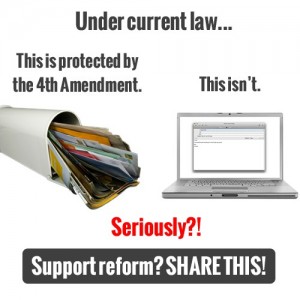 An antiquated federal law that currently allows police officers to obtain and read emails without a warrant could see that loophole closed, if enough bipartisan agreement can be found.
An antiquated federal law that currently allows police officers to obtain and read emails without a warrant could see that loophole closed, if enough bipartisan agreement can be found.
Lawmakers on both sides of the aisle are asking their colleagues to consider revamping the Electronic Communications Privacy Act in order to bring the nearly 30-year-old law in line with modern technology.
The Electronic Communications Privacy Act of 1986 (ECPA), included a provision that allows law enforcement to obtain emails from service providers without requiring a warrant if the communications in question exist on a third-party server for more than six-months.
In 1986, few Americans kept their personal communications on the servers of Internet Service Providers. Users almost always downloaded their correspondence onto their personal computers. Cloud technology has now made that practice increasingly obsolete. Today, email users often let messages sit indefinitely on decentralized servers. This allows for downloading and sending messages from any internet-ready device.
In exchange for that convenience benefit, messages stored remotely in the “cloud” become readily available to investigators who currently do not even need to obtain a warrant to ask tech companies for your correspondence.
Lawmakers in Washington seem ready to protect users (including themselves) by updating the ECPA.
Rep. Zoe Lofgren (D-California) recently told northern-California-based channel KQED News, that current law is based “on the presumption, I guess, that nobody has a privacy interest in emails stored beyond 180 days.”
“That’s absurd,” said Lofgren, who is trying to change the law by way of a bill proposed this week that has already garnered bipartisan support.
Along with Reps. Ted Poe (R-Texas) and Suzan DelBene (D-Washington), Lofgren is putting her weight behind the Online Communications and Geolocation Act in an effort to modernize ECPA in a way that requires law enforcement officers to obtain a warrant before they ask any telecoms for personal messages or information that may disclose location information.
“Fourth Amendment protections don’t stop at the Internet, and Americans rightly expect constitutional protections to extend to their online communications and location data,” Lofgren told The Hill.
Disclaimer: On January 4, 2016, the owner of WestEastonPA.com began serving on the West Easton Council following an election. Postings and all content found on this website are the opinions of Matthew A. Dees and may not necessarily represent the opinion of the governing body for The Borough of West Easton.






